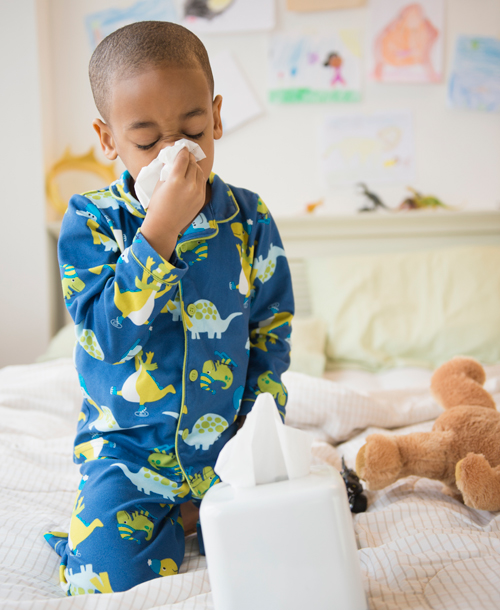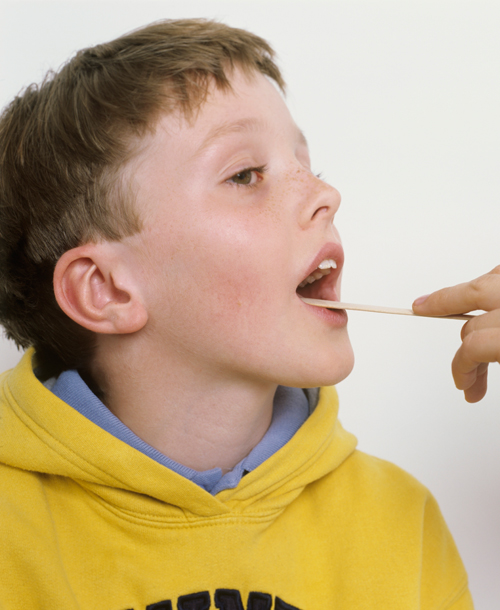Faking It!

We’ve all been there—ready to go to work, or the gym, or merely the supermarket by ourselves, when a little voice pipes up, saying, “Mommy, I don’t feel good.” Or the phone rings—as it did for me just an hour before I sat down to write this piece—with the teacher on the phone, saying my son’s nose is running “like a faucet” and I need to pick him up—now.
Sometimes the kid really is sick (you do not want to see the stuff coming out of my 12-year-old’s nostrils today). And sometimes your child might be, well, faking it.
Here's how to tell the difference.
Check What's Coming Out ... of There

A rule to live by—real sickness is often gross.
“If there is something flying out of an orifice, they are probably sick,” says Dr. Cara Natterson, a Los Angeles pediatrician and author of The Care and Keeping of You: The Body Book for Girls. “And it’s got to come with some force. That and fever. You really can’t fake those things.”
Check the Throat

Still not sure? Take a look down the throat, says Caroline Duff, an elementary school nurse in South Carolina and president of the National Association of School Nurses. “Use a small flashlight,” she says. “If the tonsils look like strawberries with white specks on them, or if there are white specks anywhere in the throat, that’s a reason [to see a doctor].”
Gauge Their Reaction to 'Home Won't Be Fun'

What if your daughter says she just feels lousy?
Sometimes kids try to fake illness because they are the only ones in the class who haven’t gotten the flu, and they think it’s their turn for a break. Or they don’t want to miss something fun at home, like a favorite aunt who’s in from out of town.
“Make it clear home is not where they want to be,” Natterson says.
That means a screen-free day, and no special treats or outings. “That’s a kid who very quickly will want to be back at school," she says.
Look for Hidden Symptoms

While stomachaches and headaches are the most common symptoms when it comes to avoiding school, parents might be too quick to brush it off as "faking." However, they can be a sign of stress or real illness.
How can you tell the difference?
Talk to your child, Duff says. Maybe they’re on the outs with a group of friends and feel sad or uncomfortable about the situation. Teachers can often help manage those kinds of situations. “For whatever reason, these are kids who are stressed out by school and trying to get out of it,” Natterson says.
If They're Really Sick

A child who’s missed more than a few days of school due to headaches or stomach pain should see his pediatrician, Natterson says. If the child’s physical health is OK, then it’s time to gather your team.
Make sure the child’s other parent is on the same page as you, Natterson advises. Go to school and chat with the teacher. Maybe she’s got information you don’t. You might also consider finding a therapist to help the child sort through complex issues.
When he’s ready to go back, let him reenter slowly, says Samantha Levy, a clinical psychologist in Los Angeles who specializes in treating children and teens with pain disorders.
When Parents Get It Wrong

And then there are the times when the kid is sick, but the parent is convinced he’s not.
When Ann Eggleston’s son Owen was 3, she found herself scolding him all the time for not listening. After a few weeks of this, she took him to a specialist. Her son’s ear infection turned out to be so acute that “he was basically watching us and reading our lips,” she says. “I felt like the worst mother ever.”
Bottom line: Tell your child you're going to take him to the doctor. No child wants to be called out as a faker. If they're OK with going, though, then that's a strong sign to take them seriously.




